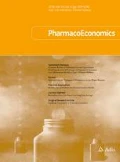Abstract
Background: In 2005, a new technology appraisal process (the Single Technology Appraisal [STA]) was implemented by the National Institute for Health and Clinical Excellence (NICE), an independent agency that provides guidance to the UK NHS on the use of technology. The objective of STAs was to provide faster guidance to the NHS in order to help overcome the problems of ‘NICE blight’.
Methods: Publicly available data from the NICE website and date of first marketing authorization (MA) from the Electronic Medicines Compendium were used to determine if STAs for cancer technologies have in fact been able to provide faster guidance than multiple technology appraisals (MTAs) for cancer interventions.
Results: STAs in cancer have, on average, taken 12.8 months from the date that NICE lists in the project history to guidance date. This compares with 20.7 months for MTAs in cancer. However, the time between the date of first MA and guidance is longer for cancer-related STAs than MTAs (95.1 months vs 74.6 months). The reasons for this are not clear; however, the STA programme includes examples of using an older product to treat a new cancer site, which may account for some of the differential. It may also reflect the timing that products are referred to NICE.
Conclusions: The overall results suggest that STAs may be faster once NICE looks at the specific product, but that there is a greater delay in the referral of STA products to NICE than for MTA products. However, the time taken for STAs is still short of the target of 9.75 months (or 39 weeks) [assuming no appeals].


Notes
Recommendations are summarized in line with the approach taken by the Office of Fair Trading (OFT), where recommendations are classified as either recommended with no restrictions and therefore recommended for general use, recommended with restrictions or not recommended.[9]
References
United Kingdom Parliament. Select Committee on Health: written evidence. Evidence submitted by the American Pharmaceutical Group (NICE 89). 2007 Mar[online]. Available from URL: http://www.publications.parliament.uk/pa/cm200607/cmselect/cmhealth/503/503we06.htm [Accessed 2008 Jul 1]
United Kingdom Parliament. Select Committee on Health: written evidence. Evidence submitted by the Bioindustry Association (BIA). 2007 Mar[online]. Available from URL: http://www.publications.parliament.uk/pa/cm200607/cmselect/cmhealth/503/503we14.htm [Accessed 2008 Jul 1]
United Kingdom Parliament. Select Committee on Health: written evidence. Evidence submitted by Bowel Cancer UK. 2007 Mar[online]. Available from URL: http://www.publications.parliament.uk/pa/cm200607/cmselect/cmhealth/503/503we15.htm [Accessed 2008 Jul 1]
United Kingdom Parliament. Select Committee on Health: written evidence. Evidence submitted by Cancer Research UK. 2007 Mar[online]. Available from URL: http://www.publications.parliament.uk/pa/cm200607/cmselect/cmhealth/503/503we22.htm [Accessed 2008 Jul 1]
United Kingdom Parliament. Select Committee on Health: written evidence. Evidence submitted by Royal College of Physicians of Edinburgh. 2007 Mar[online]. Available from URL: http://www.publications.parliament.uk/pa/cm200607/cmselect/cmhealth/503/503we64.htm [Accessed 2008 Jul 1]
House of Commons Health Committee. National Institute for Health and Clinical Excellence. First report of session 2007–08: volume 1. London: The Stationery Office Limited, 2007 Dec 17[online]. Available from URL: http://www.publications.parliament.uk/pa/cm200708/cmselect/cmhealth/27/27.pdf [Accessed 2008 Jun 13]
National Institute for Health Research. NIHR Health Technology Assessment Programme. HTA work with NICE[online]. Available from URL: http://www.ncchta.org/about/customers/NICE/index.shtml [Accessed 2008 Jun 13]
National Institute for Health and Clinical Excellence. Consultation on the process for single technology appraisals[online]. Available from URL: http://www.nice.org.uk/aboutnice/howwework/devnicetech/technologyappraisalprocessguides/singletechnologyappraisalsprocess/consultation_on_the_process_for_single_technology_appraisals.jsp [Accessed 2008 Jun 13]
Office of Fair Trading. Annexe B: review of NICE, SMC, and AWMSG. London: OFT, 2007 Feb[online]. Available from URL: http://www.oft.gov.uk/shared_oft/reports/comp_policy/oft885b.pdf [Accessed 2008 Jun 13]
National Institute for Health and Clinical Excellence. Guide to the single (STA) process. London: NICE, 2006: 8, 33[online]. Available from URL: http://www.nice.org.uk/nicemedia/pdf/STA_Process_Guide.pdf#null [Accessed 2008 Oct 1]
National Institute for Health and Clinical Excellence[online]. Available from URL: http://www.nice.org.uk [Accessed 2008 Oct 1]
Electronic Medicines Compendium[online]. Available from URL: http://emc.medicines.org.uk/ [Accessed 2008 Sep 17]
Acknowledgements
No sources of funding were used to assist in the preparation of this article. The author is an independent consultant who has received funding in the past from the pharmaceutical industry and government organizations.
Author information
Authors and Affiliations
Corresponding author
Rights and permissions
About this article
Cite this article
Barham, L. Single Technology Appraisals by NICE. Pharmacoeconomics 26, 1037–1043 (2008). https://doi.org/10.2165/0019053-200826120-00006
Published:
Issue Date:
DOI: https://doi.org/10.2165/0019053-200826120-00006

